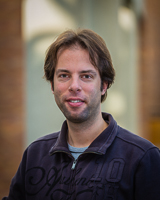Faculty Candidate Seminar
Building an Operating System for the Data Center
Add to Google Calendar

Data centers run a range of important applications with ever
increasing performance demands, from cloud and server computing to Big
Data and eScience. However, the scaling of CPU frequency has stalled
in recent years, leading to hardware architectures that no longer
transparently scale software performance. Two trends stand out: 1)
Instead of frequency, hardware architectures increase the number of
CPU cores, leaving complex memory system performance and CPU
scheduling tradeoffs exposed to software. 2) Network and storage I/O
performance continues to improve, but without matching improvements in
CPU frequency. Software thus faces ever increasing I/O efficiency
demands.
In my research, I address how operating systems (OSes) can handle
these growing complexity and performance pressures to avoid becoming
the limiting factor to performance. I first explain how current OS
architecture is already inadequate to address these trends, limiting
application performance. I then present how the OS can be redesigned
to eliminate the performance limitations without compromising on
existing features or application compatibility. I finish with an
outlook on how these hardware trends affect software in the future and
present ideas to address them.
Simon is a postdoctoral research associate at the University of
Washington, where he leads research in operating systems and
networks. His postdoctoral advisors are Tom Anderson and Arvind
Krishnamurthy. Simon received a Ph.D. in Computer Science from ETH
Zurich in 2012 and an MSc in Computer Science from the
Carl-von-Ossietzky University Oldenburg, Germany in 2006.
Simon's research focus is on data center performance issues. For his
work on the Arrakis high I/O performance operating system, he received
the Jay Lepreau best paper award (2014) and the Madrona prize
(2014). Previously, Simon has worked on the Barrelfish multicore
operating system and conducted further award-winning systems research
at various locations, including MSR Silicon Valley, MSR Cambridge,
Intel Labs Germany, UC Riverside, and the NSF.
 MENU
MENU 
